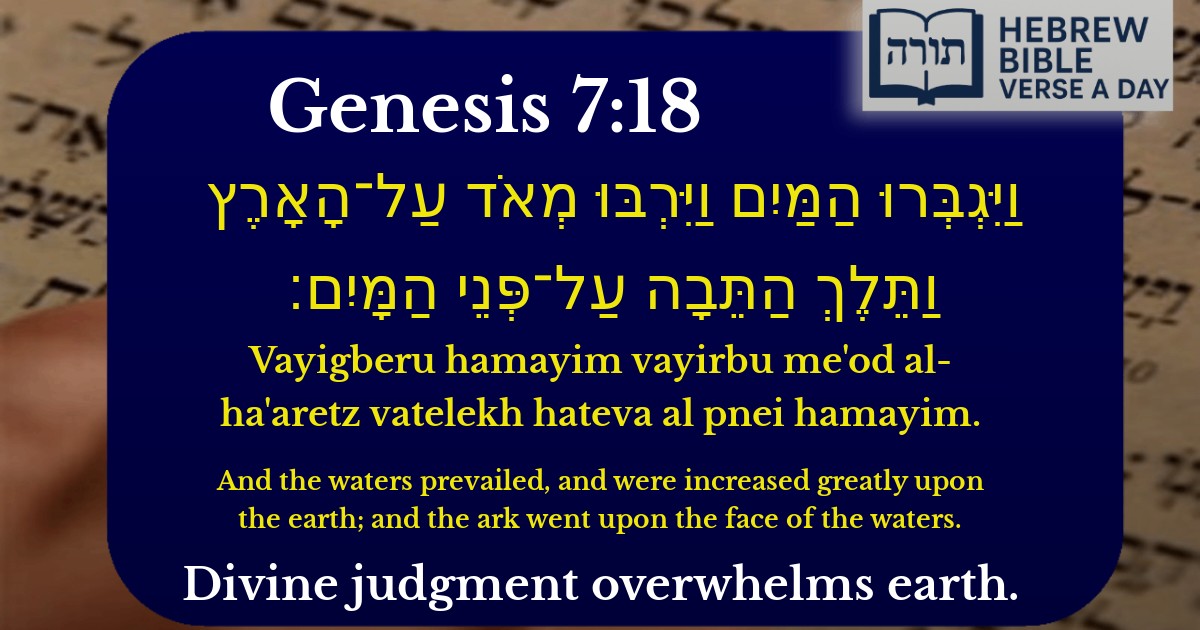Join Our Newsletter To Be Informed When New Videos Are Posted
Join the thousands of fellow Studends who rely on our videos to learn how to read the bible in Hebrew for free!
Hebrew Text
וַיִּגְבְּרוּ הַמַּיִם וַיִּרְבּוּ מְאֹד עַל־הָאָרֶץ וַתֵּלֶךְ הַתֵּבָה עַל־פְּנֵי הַמָּיִם׃
English Translation
And the waters prevailed, and were increased greatly upon the earth; and the ark went upon the face of the waters.
Transliteration
Vayigberu hamayim vayirbu me'od al-ha'aretz vatelekh hateva al pnei hamayim.
Hebrew Leining Text
וַיִּגְבְּר֥וּ הַמַּ֛יִם וַיִּרְבּ֥וּ מְאֹ֖ד עַל־הָאָ֑רֶץ וַתֵּ֥לֶךְ הַתֵּבָ֖ה עַל־פְּנֵ֥י הַמָּֽיִם׃
וַיִּגְבְּר֥וּ הַמַּ֛יִם וַיִּרְבּ֥וּ מְאֹ֖ד עַל־הָאָ֑רֶץ וַתֵּ֥לֶךְ הַתֵּבָ֖ה עַל־פְּנֵ֥י הַמָּֽיִם׃
🎵 Listen to leining
Parasha Commentary
📚 Talmud Citations
This verse is quoted in the Talmud.
📖 Sanhedrin 108b
The verse is referenced in the context of discussing the flood and the survival of Noah and his family in the ark.
📖 Zevachim 113b
The verse is mentioned in a discussion about the dimensions and movement of the ark during the flood.


The Prevailing Waters in the Flood Narrative
The verse states: "וַיִּגְבְּרוּ הַמַּיִם וַיִּרְבּוּ מְאֹד עַל־הָאָרֶץ" ("And the waters prevailed, and were increased greatly upon the earth"). Rashi (Bereishit 7:18) explains that the term "וַיִּגְבְּרוּ" ("prevailed") indicates the waters overpowered the earth, rising higher and higher until they submerged even the tallest mountains. The doubling of language—"וַיִּרְבּוּ מְאֹד" ("increased greatly")—emphasizes the intensity of the deluge, showing that this was no ordinary rain but a divinely ordained catastrophe.
The Ark's Movement on the Waters
The second part of the verse states: "וַתֵּלֶךְ הַתֵּבָה עַל־פְּנֵי הַמָּיִם" ("and the ark went upon the face of the waters"). The Midrash (Bereishit Rabbah 32:11) notes that the ark did not merely float passively but was guided by divine providence. The Ramban (Bereishit 7:18) adds that the ark's movement was miraculous, as it withstood the turbulent waters without capsizing, demonstrating Hashem's protection over Noach and those with him.
Symbolism of the Waters
Lessons from the Ark's Journey
The Sforno (Bereishit 7:18) emphasizes that the ark's survival amidst the chaos symbolizes the concept of השגחה פרטית (divine individual providence). Just as Noach was safeguarded in the ark, so too does Hashem protect the righteous even in times of global upheaval. The Malbim further notes that the ark's steady movement teaches that those who adhere to divine instruction will find stability even in turbulent times.